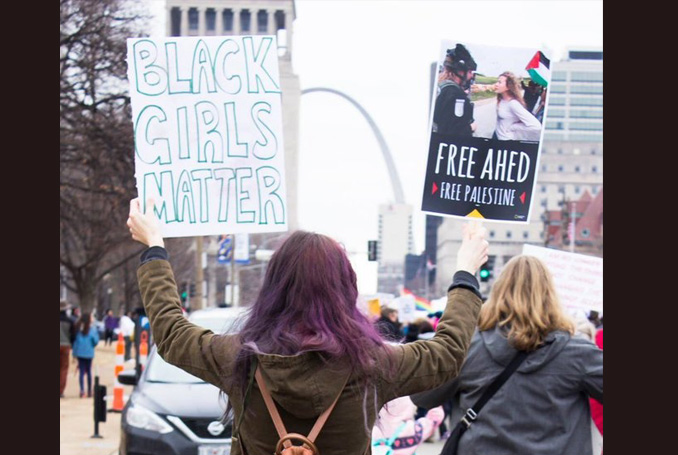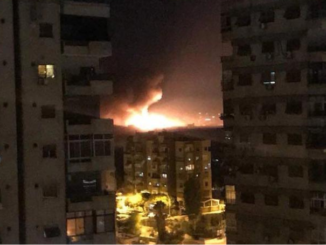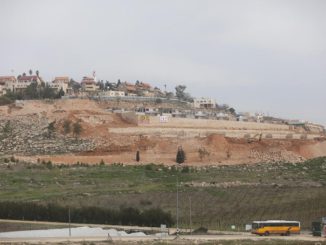
The Palestinian struggle for human rights and liberation is part of a global fight against racist structures. The contemporary inclusive protest, such as the movement Black Lives Matter, or the Boycott, Divestment, Sanctions (BDS) action against Israel, has oftentimes employed transnational and intersectional approaches, emphasizing the plurality of instances of oppression that an individual can experience.
The recognition of links between Israel’s oppression of Palestinians and other realizations of racism has been identified as a strategic threat by Israel, whose government has depended on the exclusion of Palestinians from humanity and the propagation of civilizational binaries. As the ongoing vilification of U.S. Congresswoman Ilhan Omar and the recent attacks scholars like Michelle Alexander, Marc Lamont Hill, and Angela Davis show, Zionists are trying to limit Black protesters’ analysis of Palestinian suffering.
What is Intersectionality?
The theory of intersectionality emerged following a frustration over white feminism’s reproduction of heteronormative patriarchy. Kimberlé Crenshaw coined the term when she theorized how women of color are oppressed as both women and as people of color. Intersectional approaches stress the plurality of factors of identity that are targeted by oppressive policies, such as the marginalization of racial, ethnic, religious, gender, sexual, and other factors of an individual’s identity.
It is unsurprising then that, in Zionist discourses, intersectionality has recently become demonized as “hypocrisy”, a “political weapon”, the “latest strategy of Israel-haters,” or, according to Alan Dershowitz, “a code word for anti-Semitism”.
The “End of Israel” Canard
In a piece for The Observer, Ziva Dahi asked:
“Will the Israel-haters eventually wake up from the fantasy of intersectionality, their obsession with victimization, the idolization of Palestinians and the demonization of Israelis?”
Bret Stephens complained in the New York Times about an alleged progressive assault on Israel.
Zionists have invested rhetoric efforts in diminishing intersectionality in order to shield Israel from criticism. However, all points presented by Israel’s supporters exploit traditional colonial myths and blatant anti-Palestinian racism.
Freedom for Palestinians is simply incompatible with the expansion of Zionism, which – as a movement based on the exclusion of Palestinians – is antonymous to universal human rights. As a consequence, supporters of Zionism continue to depict Palestinians as a plague and demographic time bomb, whose survival endangers the existence of Israel.
Stephens identifies the protest chant “From the river to the sea” as a “tediously malign … call to end Israel as a Jewish state.” As he correctly realizes, Israel, as a “Jewish state,” can only exist as long as it excludes Palestinians.
Similarly, in an attack on intersectionality, ADL associate Sharon Nazarian advocated in the Forward for the dispossession of Palestinians. She demonized the right of return of Palestinian refugees, which was granted by the UN, as “the de-facto end of the Jewish state.”
The apocalyptic end of Israel is a common Zionist talking point that reveals the racist fundaments of Zionism, namely, that Palestinians should not return to their homeland simply because they are not Jewish, and that the implementation of human rights and international law would signify the end of Israel.
The “Jews are Zionists” Canard
Zionism emerged in the 19th century, not from Judaism, but as a European settler-colonial movement that catered to dominant Christian anti-Semitism at that time and has thrived on the exploitation of Orientalist structures present in Western cultures. Zionists have abused Judaism as a rhetorical shield in order to present an intersectional and anti-colonial critique of Zionism as anti-Semitic racism.
In his comment on intersectionality, Stephens portrays Zionist politics as ethnonational features of Judaism, thus, categorically dismissing discourses on colonization, apartheid, and genocide, as anti-Semitic. Paradoxically, Stephens himself politicizes all Jews into Zionists in order to justify his support for Zionism and to present Israel as vulnerable in a “Middle East saturated with genocidal anti-Semitism.”
Nazarian attempts to include Zionism in feminism by portraying the former as a Jewish movement. She claims that “excluding Jewish women from [feminism]” was “disturbing.” Zionism is, however, an antonym to feminism. While feminism reveals injustice and advocates for equality, Zionism perpetuates injustice based on the ideal of supremacy and structurally relies on the oppression of Palestinian women.
The “Complicated and Complex Conflict” Canard
Zionists dismiss intersectional analysis, as they insist on the situation in Palestine/Israel being a historically and geographically isolated moment that has nothing to do with the rest of the world and is allegedly too complex for ordinary people to understand, or, as Stephens puts it, “far more complicated than the black-and-white picture drawn by Israel’s progressive critics.”
Dahi complains that proponents of intersectionality recognize different forms of oppression as constituting an intersecting system “even if occurring in unconnected geographic, cultural and political environments.” The author, however, attempts to isolate the Palestinian struggle from time and space.
Israeli exceptionalism necessitates this very approach. Zionist myths follow the narrative that Palestinians do not deserve anyone’s empathy because Palestinians are terrorists, terrorism is genetically and culturally embedded in Palestinianness, no one is as dangerous as Palestinians, and Israel, as Europe’s last and most vulnerable colony, therefore has the right to “defend itself.”
Zionists fear that non-Palestinians might, instead of adhering to Israel’s narrative, indeed feel empathy with Palestinians. It is thus only logical that Zionist pundits will attack Black Lives Matter, the National Women’s Studies Association, Jewish Voice for Peace, and Students for Justice in Palestine.
The Orientalist & Islamophobic Canard
Dahi then justifies the oppression of Palestinians by evoking Orientalist tropes, when she claims that Palestinians execute gays and practice honor killings.
Propagating that Palestinians deserve to suffer because of their unique backwardness and that their struggle cannot be related to any other struggle is part and parcel of the colonizer’s erasure of the colonized.
Palestinian resistance is then portrayed as Islamist fanaticism. In claiming that “Israel’s enemies were committed to its destruction long before it occupied a single inch of Gaza or the West Bank,” Stephens presents Israel as being under constant existential threat and discredits Palestinian resistance as pre-political hatred. Implying that Israel’s 1967 occupation is the cause of today’s problem, is a liberal Zionist fallacy, when, in reality, the colonization of Palestine started at the end of the 19th century.
Blaming the Victims
Exploiting that very Israeli exceptionalism, Zionist proponents readily blame Palestinians for their misery, while concealing the unequal, colonial power relations.
Nazarian claims that Palestinians “repeatedly failed to demonstrate a commitment to peace” and dismisses the Palestinian narrative’s “deep-rooted delegitimization of Israel and Zionism.”
Blaming Palestinians is in line with Stephens’ writings. He previously advocated for colonialism, and discussed a “disease” of the “Arab mind.” Stephens defended Israel’s massacre of Palestinians during the Great Return March and blamed Palestinians.
In his take on intersectionality, he was outraged that liberals were not condemning Palestinians harshly enough. When absolving Israel of its responsibility for Palestinian suffering, Stephens refers to Palestinians (dehumanized linguistically into “Hamas”), as “murderers,” “misogynists,” and “homophobes,” who, according to him, have no future due to their “culture of victimhood, violence and fatalism.”
Zionism-as-Liberation Myth
Sometimes, Zionism is even sold as a progressive movement. In a Tablet piece, Benjamin Gladstone advocated for the inclusion of Jews into intersectionality. While the author seems to understand Crenshaw’s theory, he fails to view Jews outside of Zionist frameworks. His argument that “Jewish issues do belong in the intersectional justice movement,” is of course correct. However, by equating anti-Semitism and anti-Zionism, he postulates both as “serious intersectional problems,” and thus alleges anti-Jewish racism to be a feature of intersectionality. Even more, the author paints Zionism as a “liberation movement” that “has the potential to not only coexist with but also support and energize other liberation movements, from women’s liberation to Palestinian nationalism.” This attempt to romanticize a genocidal settler-colonial movement overwrites the plight of Palestinians and marginalizes Jewish opposition to Zionism.
Why Intersectionality is Anti-Zionist
One has to wonder if Zionists, as exemplified by these authors, are aware of what Zionism means – especially for its victims. If it was not obvious that Zionism is based on the continuous exclusion and removal of Palestinians, these texts make that very clear. The authors reveal that Zionism creates racist hierarchies and civilizational binaries out of a Eurocentric core. Thus, the author proves exactly why intersectionality is anti-Zionist.
Intersectional analysis would insist on the difference between Jews and Zionism as a political ideology. In fact, it would deconstruct the multiple ways in which Jews are oppressed within and outside of the framework of Zionism. The Jews of Color and Sephardi/Mizrahi Caucus, for example, defined as intersectional analysis an “anti-racist, anti-colonial organizing and solidarity to break down the barriers that interlocking systems of domination place between oppressed communities and which seek to divide and conquer us.”
While supporters of Zionism tend to claim that intersectional activists are singling out Israel, it is Zionists themselves who depend on Israeli exceptionalism, presenting Palestinian freedom as genocidal for Jews.
But, beyond these myths, there is no moral, nor legal basis to defend Israel’s structurally racist treatment of Palestinians.
As the mentioned texts show, Zionists have a hard time making a valid argument without dismissing international law and human rights. As a Eurocentric and Orientalist movement, Zionism thrives, rhetorically and literally, on racist/civilizational binaries.
The intersectional analysis helps to identify the racist, socio-economic, classist, and sexist marginalization of Black Jews, African refugees, Palestinians, and other groups under Israeli rule. It can potentially strengthen cooperation between Israel’s many victims. But precisely this de-colonial potential is highly problematic for Zionism – a settler-colonial ideology that has implemented racist hierarchies.
– Denijal Jegić is a postdoctoral researcher, currently based in Beirut, Lebanon. He is the author of “Trans/Intifada – The Politics and Poetics of Intersectional Resistance.” (Heidelberg: Universitätsverlag Winter, 2019). He contributed this article to The Palestine Chronicle. Visit his website: DenijalJegic.com







